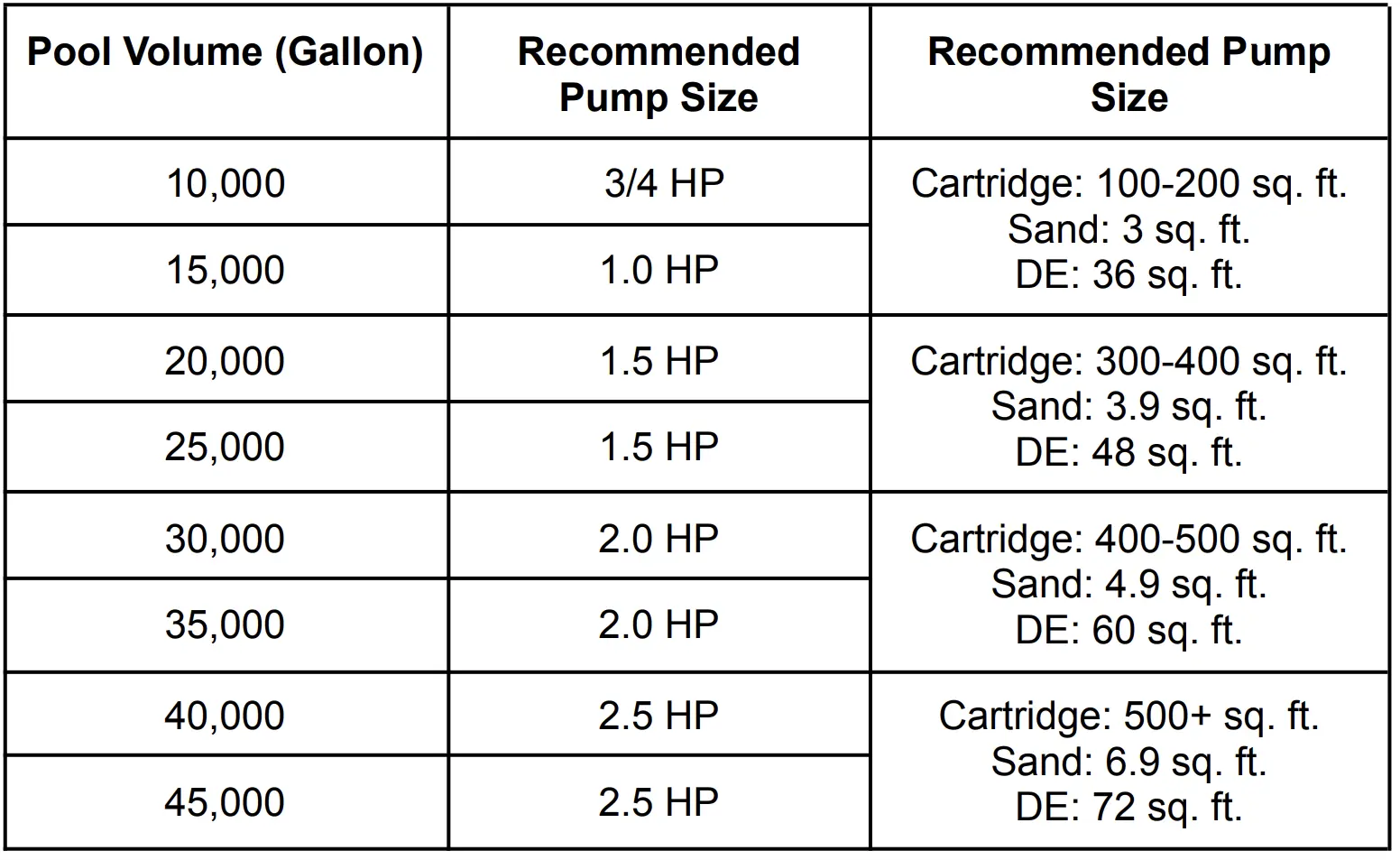(Sizes & Chart) What Size Pool Filter Do I Need For My Pool?
By MIKE DEVID
What size pool filter do I need? This is a common question for customers who want to replace or buy a new pool filter.
In theory, It doesn’t matter, You can use any size of pool filter with any size of pool.
What changes is the time between two cleaning. Pool filter size is more about the frequency of the cleaning cycle. So,
What Size Pool Filter Do I Need?
When it comes to choosing the right pool filter remember this principle. ‘’Smaller the pool filter more frequent cleaning (Maintenance), Bigger the pool filter less frequent cleaning.’’
Quick Answer to your query,

5000 Gallon Pool – 100 sq. ft.
10000 Gallon Pool – 200 sq. ft.
12000 Gallon Pool – 200-300 sq. ft.
15000 Gallon Pool – 200-300 sq. ft.
20000 Gallon Pool – 300-400 sq. ft.
25000 Gallon Pool – 400 sq. ft.
30000 Gallon Pool – 400-500 sq. ft.
40000 Gallon Pool – ≥ 500 or Dual Filter System
* The first number is how many gallons of water your pool has.
* And the second one is what size of Cartridge pool filter you need.
This is the standard cartridge pool filter size according to your pool volume. I recommend oversizing of cartridge filter.
In general ‘Bigger Is Better’. Don’t buy too small or too big a pool filter for your pool.
Why? Let’s understand…
How To Choose Right Pool Filter Size For A Pool?
When it comes to choosing the right pool filter size for above ground pool or inground pool you have to understand some key metrics like
Pool Volume, GPM, Type of Filter, Pump Turnover Rate, Head Resistant, and Filter Flow Rate.
Let’s Understand one by one.
Steps To Select the Right Pool Filter Size
Measure Pool Volume
Golden Rule of the Industry: To achieve optimum water clarity, it’s essential to circulate and filter the entire pool volume three times within 24 hours. This ensures that 90% of the pool water undergoes filtration at least once during this timeframe.
Pool volume helps you with compatible filter sizes. To calculate the pool volume in gallons, we require the measurements of your pool dimensions and the shape of the pool. Here is the formula to measure pool volume for every shape.
NOTE: All the measurements in Feet & One cubic foot equals 7.48 gallons
1. Rectangular or Squire
Length X Width X Depth X 7.5 = Pool Volume (Gallons)
2. Round or Circle Pool
3.14 X (Radius)² X Depth X 7.5 = Pool Volume (Gallons)
3. Oval Pool
3.14 X Length X Width X 0.25 X Depth X 7.5 = Pool Volume (Gallons)
After determining the volume of your pool you can measure how much water needs to be filtered in one minute to completely filter all the water within 8 hours.
Percentage of pool volume filtered in each turnover
- 63% – 1st
- 86% – 2nd
- 95% – 3rd
- 98% – 4th
Many pool owners do not run filters for 24 hours because of the noisy sound of the filter and pump. So make sure you follow the recommended filtration volume according to how many hours you will run the filter in a day.
Determine Filter Flow Rate
Filter flow rate is “how many gallons of water a pool filter cleans in one minute” It is measured in GPM(Gallons per minute) Unit
Example:
Let’s suppose you have a pool with a volume of 30,000 gallons and you need to clean all the volume within 8 hours accounting for standards. So,
30000/8×60(Minutes)= 62.5 Gallons Per Minute
So, You need a pool filter that has at least a 63 or greater than 63 GMP Filter Rate to clean all the water within 8 hours. Sometimes it is not precise, So determine the maximum design flow rate to select the right pol filter size.
Buy a pool filter that has a higher filter flow rate than required.
Type of Pool Filter
There are 3 types of pool filters to clean your pool water
- Cartridge pool filter
- Sand Filter
- D.E. (Diatomaceous Earth Filter
1. Cartridge Filter
The cartridge is the 2nd most efficient pool filter. To clean the cartridge pool filter you need to take the filter grid apart and clean it by hose. It can filter up to 5-20 micron size of particles.
Cartridge pool filter capacity to filter water in one minute. Now check what size cartridge filter is for your pool.
- 100 sq. ft. = 32-38 Gallons Per Minute (GPM)
- 200 sq. ft. = 55-75 GPM
- 300 sq. ft. = 80-112 GPM
- 400 sq. ft. = 100-150 GPM
Cartridge pool filters have a higher flow rate and turnover rate than other filters because they don’t have a multiport valve. So choose a high HP pump for the cartridge pool filter.
2. Sand Filter
Sand filter is the least efficient out of 3 filter types in terms of cleaning particle size. But most people use this filter in America. Sand filters can clean 20-100 micron particles. To clean the sand filter you have to backwash your filter regularly.
Sand filter capacities are as follows:
- 1.8 sq. ft. = 40 Gallons Per Minute (GPM)
- 2.3 sq. ft. = 50 GPM
- 3.1 sq. ft. = 60 GPM
- 4.9 sq. ft. = 100 GPM
3. D.E. Filter
Diatomaceous Earth (DE) Filter is the most efficient filter. It can filter up to 3-5 micron size of particles. To clean the DE filter you need to backwash your filter regularly or you can manually clean the filter grid.
D.E. filter capacities are as follows:
- 24 sq. ft. = 36-48 GPM
- 36 sq. ft. = 54-72 GPM
- 48 sq. ft. = 72-96 GPM
- 60 sq. ft.= 90-120 GPM
Tip: For low-volume pools use a cartridge pool filter and for ≥ 25k gallons of pool water volume choose a sand filter. For the most thorough cleaning, especially targeting tiny particles, the DE filter stands out as the best choice.
Choose the Pool filter size
Now You know what size filter you need for your pool. Bigger is better, it protects from overworking. And reduce the cleaning and backwashing cycle for your pool filter. It also helps in filter longevity and efficient filtration for a long time.
Remember: Don’t use a very big pool filter, It will reduce the flow rate by the pump resulting in inefficient filtration.
If you are looking for a pool filter size chart then refer to this guide for comprehensive information on filter sizes and their corresponding flow rates. Pool filter size chart
Conclusion
In conclusion, If you choose a small pool filter it will take more time to clean and backwash. The larger the pool filter, the less frequent the cleaning, backwashing, and maintenance cycles. So go as long as possible but don’t choose too large a size.
This is all about determining the ideal pool filter size to ensure optimal pool functionality. Understanding the appropriate filter size is crucial for maintaining a well-functioning pool. If you have any questions, let me know in the comments. Happy Swimming!
